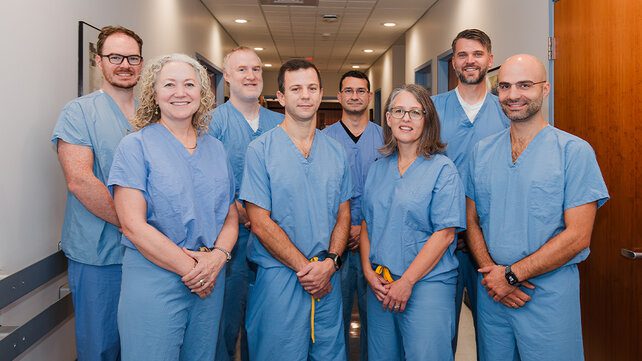Bariatric & Weight Management Program
To Schedule an Appointment

Adult Bariatric Surgery
Achieve Lasting Weight Loss with Expert Surgical Care
At Brown Surgical Associates, our board-certified bariatric surgeons specialize in helping adults achieve significant and sustainable weight loss through advanced surgical techniques. Our comprehensive program combines surgical expertise with personalized support to guide you toward a healthier lifestyle.
Understanding Bariatric Surgery
Bariatric surgery, commonly known as weight loss surgery, involves procedures that limit food intake and/or nutrient absorption to promote weight loss. These surgeries are effective tools for individuals struggling with obesity, especially when traditional methods like diet and exercise haven't yielded desired results.
Determining whether bariatric surgery is right for you can be a lengthy, multi-step process that requires commitment. Your surgeon’s office will work with you and explain the process and requirements as there may be additional criteria needed by your insurance company before approval for surgery is granted.
Health Risks Associated with Obesity
Obesity is a serious, progressive condition that can significantly reduce life expectancy and quality of life. It increases the risk of several health issues, including:
-
Type 2 diabetes
-
High blood pressure (hypertension)
-
Heart disease
-
Sleep apnea
Addressing obesity through bariatric surgery can lead to substantial improvements in these conditions.

Bariatric Surgery Specialists
Our Multidisciplinary Approach
Determining if bariatric surgery is right for you involves a thorough, multi-step process. Our team will guide you through each phase, including:
-
Initial consultation and evaluation
-
Assistance with insurance authorization and requirements
-
Preoperative education and lifestyle counseling
We emphasize a collaborative approach, involving surgeons, nutritionists, and support staff to ensure you receive comprehensive care tailored to your needs.
Our specialists will assist you in committing to the lifestyle changes that will assure optimal success.
Getting Started: Orientation Video
Begin your weight loss journey by watching our orientation video, which provides detailed information about the surgical process, expectations, and lifestyle changes. After viewing, complete the online quiz to assess your understanding. A team member will then contact you to discuss the next steps.
After viewing the video Complete your online orientation
For more information please call (401) 793-3922
Comprehensive Obesity Treatment Options
Bariatric surgery is one component of our broader obesity treatment program. In partnership with Brown University Health, we offer the region's only accredited Obesity Medicine Program in southeastern New England. This program addresses obesity as a chronic disease influenced by genetic and lifestyle factors.
Our multidisciplinary team provides:
-
Nutritional counseling and intuitive eating strategies
-
FDA-approved obesity medications
-
Personalized physical activity plans
-
Behavioral therapy and health coaching
This holistic approach ensures that each patient receives a tailored plan to support long-term weight management.
Types of Bariatric Surgery
If greater weight loss is required than a gastric banding procedure can produce, a gastric bypass operation may be considered.
Gastric bypass procedures reduce food absorption, in addition to restricting food intake. Patients who have gastric bypass procedures generally lose 70% of their excess weight within one and a half years.
In a Roux-en-Y gastric bypass (RYGB) – the most common weight loss procedure – a small stomach pouch is created by stapling, which separates it from the rest of the stomach. Then a section of the small intestine is attached to the new pouch to allow food to bypass most of the original stomach and first portion of the small intestine. This reduces calorie intake as well as nutrient absorption.
The limited quantity of food, combined with the reduced absorption of calories, results in a faster weight loss than is normally achieved by the gastric banding procedure.

In this surgery, approximately 70% of the stomach is removed to limit the volume of food intake at one time.
This procedure is similar to the band procedure in that it restricts the volume of food intake. Patients can lose about 40% to 60% of their excess weight over one and a half years.
Unlike the band operation, however, this surgical procedure is permanent.

After the stomach is divided as described in the gastric sleeve procedure above, a bilio-pancreatic duodenal switch surgery is usually carried out several months later as the second stage of the operation.
During this surgery, the stomach and the first part of the small intestine are surgically separated and reattached to the last portion of the small intestine. Bilio-pancreatic duodenal switch surgery is reserved for the most severely obese patients.

Gastric banding, done laparoscopically, is less invasive and the only adjustable reversible obesity surgery available.
During this procedure, surgeons place an inflatable silicone band around the upper stomach to create a new, smaller stomach pouch that limits the amount of food that can be consumed and slows the progression of food from the stomach to the intestines.
Patients will feel full sooner and be satisfied with smaller amounts of food, which can result in losing as much as 40% to 60% of their body weight over a three-year period.
The gastric band itself is adjustable, by adding or removing fluid from the band’s interior through a small port that is placed beneath the patient’s skin. The surgeon can adjust the band via the port with minimal discomfort to the patient. If the band needs to be removed, the stomach will return to its original form and function.

In some instances, revisional endoscopic or laparoscopic bariatric surgery is needed to remove a malfunctioning band or revise a sleeve gastrectomy or gastric bypass.
Both surgical and endoscopic procedures are made available to our patients who may need revisional bariatric surgery for weight regain or malfunctioning previous bariatric surgery.
Bariatric Surgery Resources
- Complete your online orientation
- Center for Bariatric Surgery at The Miriam Hospital (Providence, Rhode Island)
- American Society for Metabolic and Bariatric Surgery (ASMBS)
- Visit Brown Surgical Associates’ bariatric surgery Facebook page
- Determine your risk for developing diabetes
Videos: Patient Experiences with Bariatric Surgery
Watch the experiences some of our patients have had with bariatric surgery.

EMT Morgan Schmitt shares what it's been like recovering from bariatric surgery during COVID-19 pandemic and how the procedure has already changed her life. MORE »
















